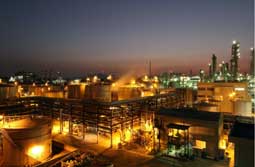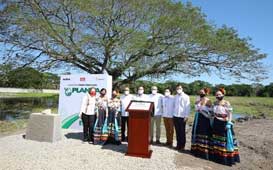Expansions: Asahi Kasei to produce acrylonitrile using bio-AN; Alpla and Coca-Cola to set up recycling plant in Mexico

Japan’s Asahi Kasei says that Tongsuh Petrochemical Corp. (TSPC), a wholly owned subsidiary in South Korea, has acquired the widely recognied international certification ISCC PLUS for its acrylonitrile (AN) as a sustainable product, and production of AN using biomass propylene is scheduled to begin in February 2022.
AN is used as a raw material to make ABS resin, acrylamide, acrylic fibre, and various other chemical products. Recent demand growth has been particularly robust in the applications of carbon fiber as a material to reduce the weight of wind turbine blades, etc., and nitrile rubber for medical gloves whose use is expanding due to heightened awareness for hygiene. Propylene is one of the most important chemical intermediates in organic chemistry. It is generated during the thermal cracking of hydrocarbons and can be produced also by bioethanol from biomass fermentation processes. Biomass means plant or animal materials that can be used to produce bioenergy. These are usually wastes from agriculture, private households, industry or forestry. Food crops such as rapeseed, corn, wheat, sugar beet or sunflowers are also used as raw materials.
ISCC (International Sustainability and Carbon Certification) is an international certification system that offers solutions for the implementation and certification of waste and residue raw materials, non-bio renewables and recycled carbon materials and fuels.
In order to achieve carbon neutrality by 2050, measures to reduce CO2 emissions throughout the product chain of fossil fuel-derivatives are gaining momentum, and AN customers are increasingly seeking to manufacture products using AN with low CO2 emissions in order to contribute to GHG reduction. Under these circumstances, Asahi Kasei and TSPC sought to reduce CO2 emissions across the AN supply chain, and in October 2021, TSPC became the first AN manufacturer in Asia to acquire ISCC PLUS certification.
The certification system enables TSPC to produce and sell AN using biomass raw material allocated by the mass-balance method. TSPC is scheduled to begin producing AN using biomass propylene in February 2022. In the case of a mixture of biomass raw materials, etc., and fossil fuel-derived raw materials in the production process, the portion of biomass product, etc., produced is assigned to certain products (biomass AN) based on ISCC PLUS System Documents and its recognized management methods.

In other news, with the aim of boosting the circular economy in the states of south-east Mexico, a cornerstone ceremony was held recently to mark the start of construction of the new PLANETA recycling plant in the municipality of Cunduacán in the State of Tabasco. The project is the result of a joint venture between packaging/recycling firm Alpla and Coca-Cola FEMSA, the largest bottler of Coca-Cola products in the world.
With an investment of more than US$60 million, the recycling plant Planta Nueva Ecología de Tabasco – better known as PLANETA – will have the capacity to process 50,000 tonnes/year of post-consumer PET bottles, which will result in 35,000 tonnes of recycled PET material ready for reuse.
The construction and operation of the PLANETA recycling plant is expected to generate more than 20,000 direct and indirect jobs and will thus make a key contribution to the objectives of the Mexican government headed by President Andrés Manuel López Obrador to promote development and employment in south-east Mexico.
Its strategic location in the region with the greatest potential for solid waste recycling will also make it an important development node that will integrate 18 collection centres throughout south and south-east Mexico. In addition to offering an environmental service, it will boost the region’s economy.
Alpla and Coca-Cola FEMSA are embracing their position as leading companies to promote and implement effective measures to reduce pollution, reuse plastic waste and reinforce the collection and recycling chain.
Alpla CEO Philipp Lehner says, “The big challenge today is the handling of the materials after the consumption phase. We are currently investing worldwide in systems to give plastic packaging a value – because then it is collected and recycled. With strong partners like Coca-Cola FEMSA at our side, we will be able to set up the necessary infrastructure and close the bottle cycle in as many regions as possible.”
In collaboration with all of the companies that make up the Coca-Cola Mexican Industry (IMCC), Coca-Cola FEMSA is part of the global World Without Waste initiative launched by the Coca-Cola Company, which aims to make all packaging 100% recyclable by 2025, integrate 50% recycled PET resin into bottles and collect 100% of the packaging by 2030.
In 2018, Alpla and Coca-Cola FEMSA joined the New Plastics Economy Global Commitment launched by the Ellen MacArthur Foundation in collaboration with the United National Environment Programme. Its goals are to make 100% of its products reusable, recyclable or compostable by 2025 and to have 25% post-consumer recycled material in total material consumption by that year.
Since 2005, Alpla Mexico, Coca-Cola Mexico and Coca-Cola FEMSA have united forces to run Industria Mexicana de Reciclaje (IMER), the first food-grade PET recycling plant in Latin America.
Located in the State of Mexico, this facility has a production capacity of 15,000 tonnes/year of flakes from post-consumer PET. Since its foundation, it has processed more than 140,000 tonnes of this material, which has been returned to the production cycle of new bottles. This has saved the same volume of virgin resin, which in turn has reduced the carbon footprint.
(IMA)Subscribe to Get the Latest Updates from IMA Please click here
©2022 Injection Moulding Asia. All rights reserved.














